Some basic etiquette for Paris; la bise, etc.
Say bonjour every place you go.
Any time you enter a business — a restaurant, bakery, café, clothing store, pharmacy, art gallery, et cetera — immediately look for the closest person who might work there, and say "Bonjour" to them (or "Bonsoir" if it's the evening). Even if they're way in the back, and even if they're helping someone at the moment, say "Bonjour" — they will too, if they're not too busy. This is very much customary and considered polite and respectful when entering anywhere. Even if you don't see anybody when you walk in, say "Bonjour." Someone will probably hear you and reply.
Any time you walk up to a counter in a hotel or a ticket window in a museum, theater, etc, say "Bonjour" or "Bonsoir" before you start asking questions.
Be sure to ASK people if they speak English!
Say "Bonjour" first. If you're brave, you can then ask in French, "Parlez-vous anglais?" If you're feeling a bit shy about trying some French, it's okay to lead with "Bonjour" and then, "Do you speak English, please?" If they do, they'll probably be more than happy to accommodate you.
In hotels, museums, etc, people will absolutely speak English. In restaurants, cafés, and shops, you might be surprised to find that they don't! It really depends on the person and the neighborhood; in touristy neighborhoods it's much easier to find people who speak English, but you still can't count on it!
If you're going to speak English with people in France, be prepared to speak clearly and use simple, direct phrases. Don't assume you can speak to them the way you speak to other Americans*; quickly, with lots of slang, etc. By the same token, don't speak extremely loudly and slowly; they're not stupid and they're not deaf. If you've ever studied another language, imagine the difference between how your language teacher spoke to you and how a native speaker of that language would speak in normal life; you'd be fine with the former and completely lost with the latter. You can see why it's important to slow things down a little bit and keep them simple. French people who are able to speak English to you are extending you an enormous courtesy; make sure to treat them with the same respect.
Say Merci, au revoir every time you leave somewhere.
This one can feel a bit weird for Americans sometimes, but it's the respectful thing to do and you need to do it! Whenever you're leaving any of the places mentioned above — restaurants, shops, et cetera — look back over your shoulder as you open the door, and say "Merci, au revoir!" to whomever is working there. Even if you can't see them, even if they're all the way in the back, even if they're in the middle of helping someone. There's an excellent chance that no matter how far away they are or how busy they are, they will quickly reply, "Merci, bonne journée/bonne soirée" (good day/good evening). If you walk out without the thank-you-goodbye, you're being a bit rude.
It's funny, I'm so used to this pattern I kind of can't help doing it even when I'm in the States. I look back as I'm leaving and I expect to catch the eye of whomever's working there, because in France they're expecting you to say goodbye, but in America of course they're not. I'll still say "thanks!" on the way out regardless.
Don't be the ugly American*.
Whatever you do, never just start speaking English to someone. This is really rude and disrespectful. Even if you know everyone in your hotel speaks English, start with "Bonjour." You're a visitor in this country. Make this small gesture of respect.
Don't be the really ugly American.
Read my article about what to wear (and what NOT to wear) during your stay in Paris. Men, take your hat off when entering a church or restaurant. C'mon, guys.Keep it down.
French people generally speak a lot more quietly in public than Americans do. Be mindful of this, especially in restaurants; if you stop and listen you'll notice the overall volume is much lower than what you're used to in the States. Try to match that level; don't be the table full of loud rude Americans!
Learn how and when to tip.
See my article on tipping in France.Camera etiquette
Many big touristy churches have a no-photos rule; look for a sign on your way in! Some ask that you simply don't use flash. Some museums and art galleries have these rules too. Some stores as well.
Never use your flash in a restaurant or bar! It's very rude to the people around you!
Keep in mind that a lot of people who happen to be in the place you're taking pictures of would really rather not be photographed. Be polite and don't make people uncomfortable.
Take your shoes off in people's homes.
If you've been lucky enough to be invited to a French person's home, assume you should take your shoes off immediately upon entering the house/apartment. The vast majority of French (or, at least, Parisian) households have this rule, whereas for me back home in the States I think only a small percentage of people I know do this. I suspect the reason most French people have a no-shoes rule in the house is that the streets of Paris are famously covered in dog shit (pardon my French). And in light of that fact, the no-shoes rule makes perfect sense.
If you don't know to take your shoes off, your hosts may be too polite to mention it, and if you realize after the fact that you're the only one wearing shoes you may be a bit embarrassed. So to be sure you can just make like you're going to remove them upon entering, and even ask your host, "Shoes off?" and they'll be happy to tell ya.
Bring a small gift.
It's customary to bring something with you when you arrive at a French person's home. Whereas this is considered polite but usually not necessary in the States, it's very much customary — pretty much obligatory — in France and most of Europe. If you get invited to a dinner party and you're the only one who doesn't bring anything, you will quickly realize your mistake and be mortified. Now, we're just talking a bottle of wine here, or a box of nice pastries or chocolates — nothing overly fancy or expensive. To my mind, booze is the perfect gift for all occasions, but that probably says more about me than it does about France, heh heh. If it's just an informal get-together, a six-pack of beer is good too. Other good options (which I never go with because I like booze too much): flowers, a small token from your home country, a decorative candle or other fancy thing like that, etc. Definitely no need to ever go above 10-15 euros, even for a fancy party. With most of these options you can probably keep it under ten.
La bise — the two kisses on the cheek
Man, this is a lovely but extremely complex custom. With strangers you'll meet in France — employees at hotels and restaurants and stores, people on the street, business associates if you're traveling for work, etc — you never need to worry about it. However, if you're a guest in someone's home, or if you meet up with friends and friends-of-friends in public, you may need to navigate the complicated world of la bise.
I wrote a very very very very (very!) long blog post about this here. It's too long. Don't bother.
First rule of la bise, you go to your left first. Screw this up in a moment of tension/confusion and you can almost accidentally kiss someone on the lips! This has happened!
You will either barely touch cheeks or even not quite touch at all. You should not touch your lips to the other person's cheeks when you perform the two kisses; you just touch cheeks (or not) and lightly kiss the air.
Some very quick guidelines:
If you're a lady:
- Meeting a man or woman in a professional situation: handshake.
- Greeting a man or woman who is a close friend: la bise.
- Meeting a man or woman who's a friend of a friend: la bise.
- In all of these situations, you should do the same when you're saying goodbye.
If you're a dude:
- Meeting a man or woman in a professional situation: handshake.
- Greeting a woman who is a close friend: la bise.
- Greeting a man who is a close friend: probably a handshake; you may graduate to la bise in some cases.
- Meeting a woman who's a friend of a friend: la bise.
- Meeting a man who's a friend of a friend: handshake.
- In all of these situations, you should do the same when you're saying goodbye.
These are the most basic guidelines I can possibly put together, but in fact it can be much, much more complex than that. Again, I wrote a very long thing about it, but it'll never be completely clear until you've spent a lot of time in France and met a ton of people in various situations.
Good luck!
*Of course all of this advice applies to non-Americans as well; the vast majority of my website's traffic comes from the US, and the rest of it is almost all from the anglophone world. All of this applies to all of us!


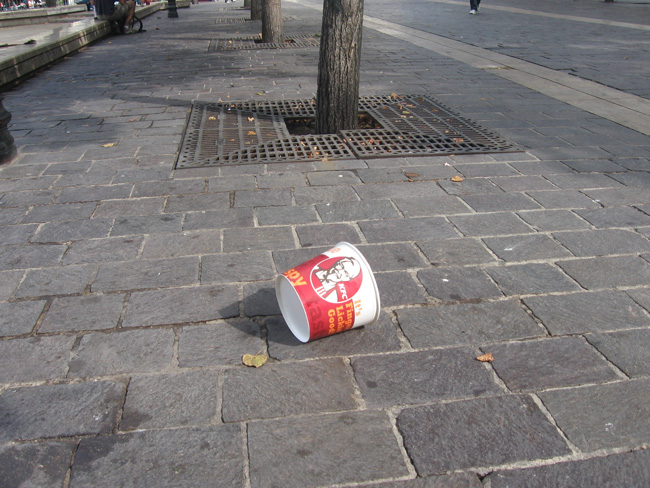
 What to wear (and what NOT to wear) during your stay in Paris
What to wear (and what NOT to wear) during your stay in Paris
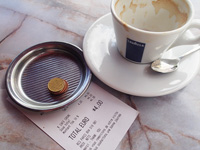 Tipping in France
Tipping in France
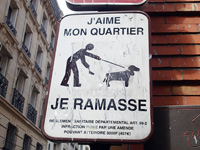 Watch your step! Dog... stuff
Watch your step! Dog... stuff
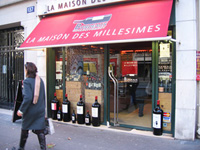 Buying a bottle of wine in Paris
Buying a bottle of wine in Paris
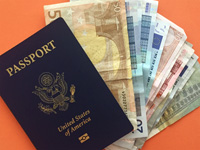 Checklist for your trip to Paris
Checklist for your trip to Paris